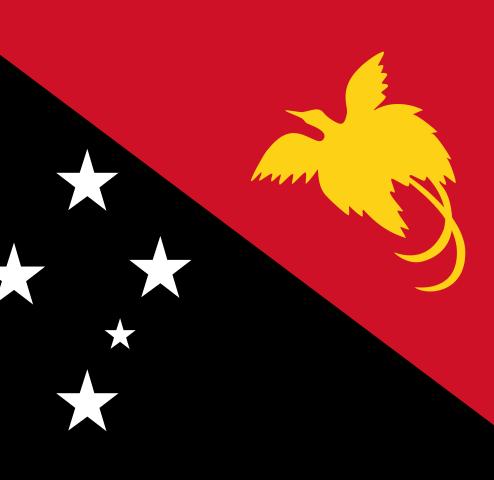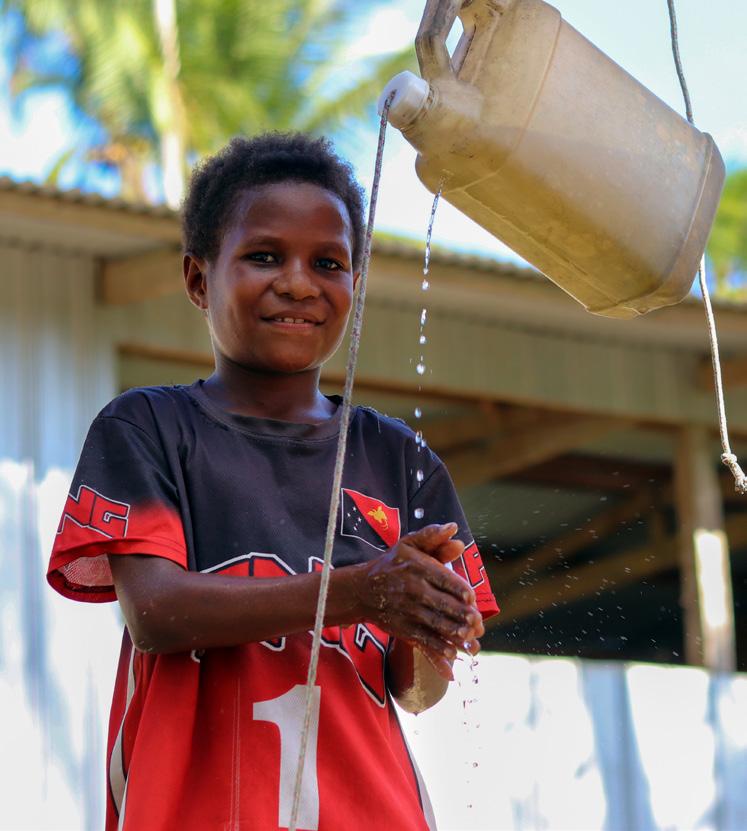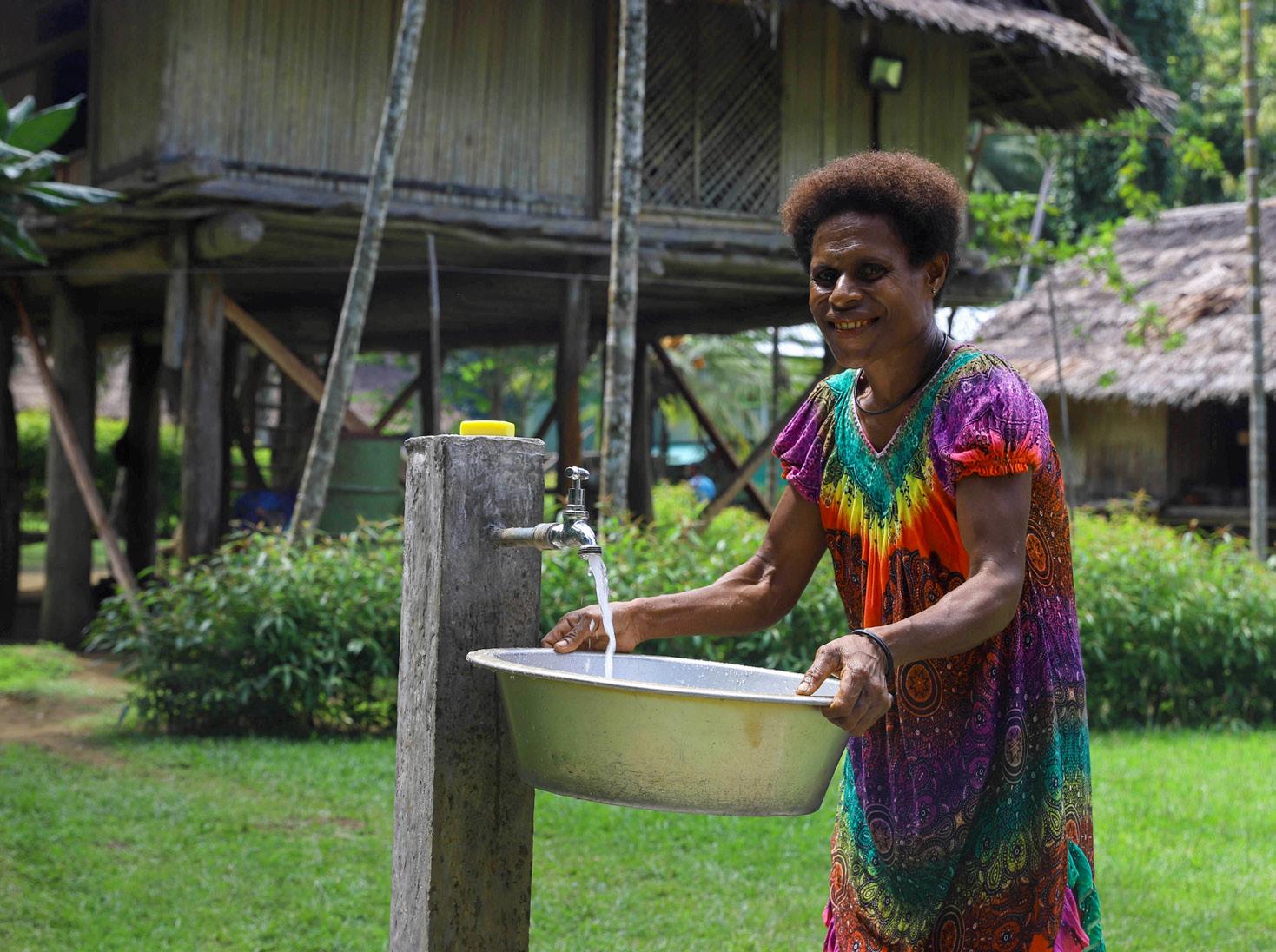
2 minute read
Our work in PNG
In FY23 WaterAid Papua New Guinea (PNG) continued to use a systems strengthening approach, working with key national and subnational government departments, and other water, sanitation and hygiene (WASH) actors to strengthen the WASH system in PNG, and develop best practice examples of WASH projects. WaterAid PNG continues to support the roll out of PNG’s National WASH Policy, and is working towards increasing WASH access for all.
WaterAid PNG continued its growth in FY23, with new projects and grants beginning, and existing projects and grants being extended. This growth is a reflection of the quality of WaterAid PNG’s projects, and our strong reputation in the PNG WASH sector.
Advertisement

Key achievements this year included:
• In partnership with the National Department of Health and the World Health Organization (WHO), WaterAid supported the development of National WASH in Healthcare Facilities Standards and Guidelines. These guidelines and standards will help strengthen the PNG healthcare system, and improve WASH infrastructure and systems in healthcare facilities.
• In partnership with the Department of National Planning and Monitoring, WASH Planning and Monitoring Unit (WASH PMU), WaterAid supported the establishment of the WASH, Water security and Climate Change Integration Technical Working Group. The working group provides a platform for key stakeholders from the health, education, climate/ meteorological, agriculture sectors, and development partners to coordinate, share learnings and develop a common agenda for the WASH, water security and climate nexus.
• WaterAid also continued to support the WASH PMU to roll-out the National WASH Monitoring and Information System (WASH MIS), supporting the delivery of two regional trainings, for the Momase and New Guinea Island’s Provinces. These trainings targeted key government officials, providing training on the MIS system, so that districts are able to undertake baseline assessments on WASH services to develop their own District WASH Plans.
• WaterAid continued to support the Wewak District WASH Coordination Body (WDWCB) to deliver the Wewak District WASH Plan. This included providing capacity building and support to the WDWCB, as well as continuing to pilot community WASH projects, with three community water projects completed directly benefiting over 1,800 people. Sanitation and hygiene training was also delivered to nearly 1,200 people from two of those communities. A major highlight was the declaration of one of the communities, Walandoum, as open defecation free by the East Sepik Provincial Health Authority.
• WaterAid continued to engage on school WASH improvements, installing WASH infrastructure in four schools in Central Province, benefiting 2,333 students and 56 teachers. We also supported the establishment of WASH Committees at the schools, and helped develop sustainability and maintenance plans that will be incorporated into the schools budgets, and provided training to key District Education Department staff. In partnership with Netball Australia and Netball PNG we also delivered Hamas Lo Pillai in 10 schools, and delivered two sessions of Come and Play in two provinces, reaching a total of 467 students. These trainings use netball training and skills development sessions to also deliver health and hygiene, and leadership and selfconfidence training for students.
• WaterAid continued to partner with the Motu Koita Assembly and Water PNG to pilot a delegated management model and network of water kiosks in Pari village. This pilot will provide a model for an affordable, reliable, and safe water supply model that can be used in other Peri-Urban and settlement communities in PNG.


• WaterAid continued to provide technical input and advice into major policies, guidelines, and other tools throughout the year, including, District WASH Operational Guidelines (EU facilitated for WASH PMU), Standards & Guidelines for Rural WASH (EU facilitated for WASH PMU), Master Trainers Manual for Community Led Total Sanitation (CLTS) (UNICEF for NDoH), and Review and Revision of the 2018 WASH in Schools Standards & Guidelines.
Total Expenditure: $3,282,155
Locations of Projects:
• National
• National Capital District
• Central Province
• East Sepik Province
Funders:
• Water For Women Fund, Australian Government
• Australian Water Partnership, Australian Government
• The Church of Jesus Christ of Latter-day Saints
• The Coca-Cola Foundation
• Team Up Sport for Development Program, Australian Government
• Australian NGO Cooperation Program
• East Sepik Provincial Government
• The SMEC Foundation
• Who Gives a Crap
• The Busbridge Family Benevolent Fund
• Corporate, foundation, and supporter contributions








